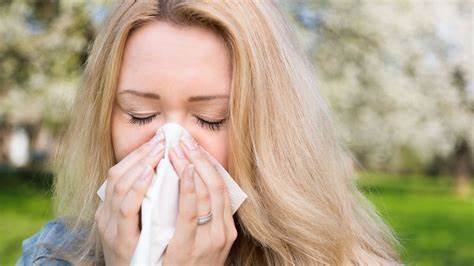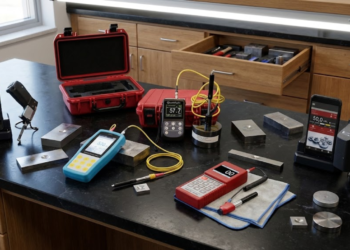Spring is in the air, and with it comes a burst of blooming flowers and lush greenery. However, for many people, it also brings an unwelcome guest seasonal mold allergies. These allergies can make the beauty of spring feel like a nightmare.
What Are Seasonal Mold Allergies?
Understanding Mold and Its Impact
Mold is a type of fungus that can grow both indoors and outdoors. While it’s a natural part of the environment, certain mold spores can trigger allergic reactions in some people. These spores become airborne and are easily inhaled, leading to various symptoms. If you are seeing mold growth in your property, immediately contact a mold removal company.
Why Spring Triggers Mold Allergies?
Spring showers and increasing temperatures create the perfect conditions for mold growth. When you combine this with blooming plants and trees, it’s no wonder that mold allergies spike during this season. Understanding why spring triggers mold allergies can help you take proactive steps to manage your symptoms.
Symptoms of Seasonal Mold Allergies
Respiratory Issues
One of the most common symptoms of mold allergies is respiratory problems. These can include a runny or stuffy nose, sneezing, coughing, and postnasal drip. In more severe cases, mold allergies can trigger asthma attacks, causing wheezing and shortness of breath.
Eye Irritation
Mold spores can also affect your eyes, leading to symptoms like itching, redness, and watery eyes. These symptoms can be particularly bothersome and impact your daily activities.
Skin Reactions
Some people may experience skin reactions due to mold allergies. These can include rashes, hives, or eczema flare-ups. If you notice any unusual skin irritation, it could be related to mold exposure.
Diagnosing Mold Allergies
When to See a Doctor?
If you suspect you have mold allergies, it’s essential to consult a healthcare professional. They can help determine the cause of your symptoms and recommend appropriate treatment options.
Allergy Testing
Allergy testing can confirm if mold is the culprit behind your symptoms. Skin prick tests and blood tests are common methods used to identify specific allergens, including mold spores.
Keeping a Symptom Diary
Keeping a symptom diary can be helpful in diagnosing mold allergies. Note down when and where your symptoms occur, as well as any potential triggers. This information can assist your doctor in making an accurate diagnosis.
Effective Solutions for Managing Mold Allergies
Reducing Indoor Mold
One of the most effective ways to manage mold allergies is to reduce mold exposure in your home. Ensure proper ventilation in damp areas like bathrooms and basements. Use dehumidifiers to keep humidity levels below 50%, and fix any leaks promptly to prevent mold growth.
Using Air Purifiers
Air purifiers with HEPA filters can help remove mold spores from the air, reducing your exposure. Place air purifiers in commonly used rooms to improve indoor air quality.
Cleaning and Maintenance
Regular cleaning can help keep mold at bay. Use mold-killing cleaners for surfaces prone to mold growth, and wash bedding and curtains frequently. It’s also essential to clean and replace air filters in your HVAC system regularly.
Natural Remedies for Mold Allergy Relief
Saline Nasal Rinses
Saline nasal rinses can help relieve nasal congestion and remove mold spores from your nasal passages. You can use a neti pot or saline spray for this purpose.
Herbal Supplements
Some herbal supplements, such as butterbur and quercetin, have been shown to reduce allergy symptoms. Consult with a healthcare professional before starting any new supplements to ensure they are safe for you.
Essential Oils
Certain essential oils, like eucalyptus and lavender, have anti-inflammatory properties that can help alleviate allergy symptoms. Diffuse these oils in your home or add a few drops to a carrier oil for topical application.
Medical Treatments for Mold Allergies
Antihistamines
Antihistamines are commonly used to relieve allergy symptoms. They work by blocking the effects of histamine, a chemical released during an allergic reaction. Both over-the-counter and prescription options are available.
Nasal Corticosteroids
Nasal corticosteroids can reduce inflammation in your nasal passages, providing relief from congestion and sneezing. These medications are available as nasal sprays and are often recommended for long-term use.
Immunotherapy
Immunotherapy, also known as allergy shots, can help desensitize your immune system to mold spores. This treatment involves receiving regular injections of small amounts of the allergen over time, gradually reducing your allergic response.
Building a Mold-Free Environment
Mold-Resistant Materials
Consider using mold-resistant materials in your home, such as mold-resistant drywall and paint. These materials can help prevent mold growth in areas prone to moisture.
Proper Landscaping
Ensure proper drainage around your home to prevent water accumulation near your foundation. Trim back vegetation to allow sunlight to reach damp areas and reduce mold growth.
Professional Mold Remediation
If you have a significant mold problem, consider hiring a professional mold remediation service. They can safely and effectively remove mold from your home and address the underlying issues causing mold growth.
Supporting Your Immune System
Healthy Diet
A healthy diet can support your immune system and reduce allergy symptoms. Include plenty of fruits, vegetables, and whole grains in your diet to provide essential nutrients.
Regular Exercise
Regular exercise can boost your immune system and improve your overall health. Aim for at least 30 minutes of moderate exercise most days of the week.
Stress Management
Stress can weaken your immune system and exacerbate allergy symptoms. Practice stress management techniques like meditation, yoga, and deep breathing exercises to keep stress levels in check.
The Connection Between Mold and Asthma
Mold as an Asthma Trigger
Mold can be a significant trigger for asthma symptoms. Inhaling mold spores can cause airway inflammation and lead to asthma attacks.
Managing Asthma and Mold Allergies
If you have both asthma and mold allergies, it’s crucial to manage both conditions effectively. Work with your healthcare provider to develop a comprehensive treatment plan.
Emergency Preparedness
Have an emergency plan in place if you experience severe asthma symptoms. Ensure you have access to rescue medications and know when to seek medical help.



![7 Best POS Software in the UK [2026 Edition]](https://todaynews.co.uk/wp-content/uploads/2026/02/7-Best-POS-Software-in-the-UK-2026-Edition-360x180.png)







































































